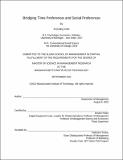Bridging Time Preferences and Social Preferences
Author(s)
Chen, Xi (Cathy)
DownloadThesis PDF (627.6Kb)
Advisor
Prelec, Drazen
Terms of use
Metadata
Show full item recordAbstract
While an immense volume of research has been conducted on time preferences and social preferences, limited studies have investigated whether there is any interaction and/or trade-off between these two important preferences in human decision-making. In this work, we fill this literature gap by investigating how time preferences (with a focus on procrastination) are affected by tasks’ prosocial nature. To do so, we designed an experiment to test the hypothesis that people have varied preferences for timing flexibility in deadlines when working on prosocial tasks vs. self-interested tasks. We propose that people may procrastinate more on prosocial tasks, because they might procure positive diagnostic utilities of a superior self-image by merely committing to a prosocial task, instead of completing it. With the analyses of individuals’ preferences for different working contracts based on conjoint analysis with three features – workload, earnings and deadlines – we found suggestive evidence that supports the hypothesis. Limitations on the current studies and plans for future research are also discussed.
Date issued
2022-09Department
Sloan School of ManagementPublisher
Massachusetts Institute of Technology